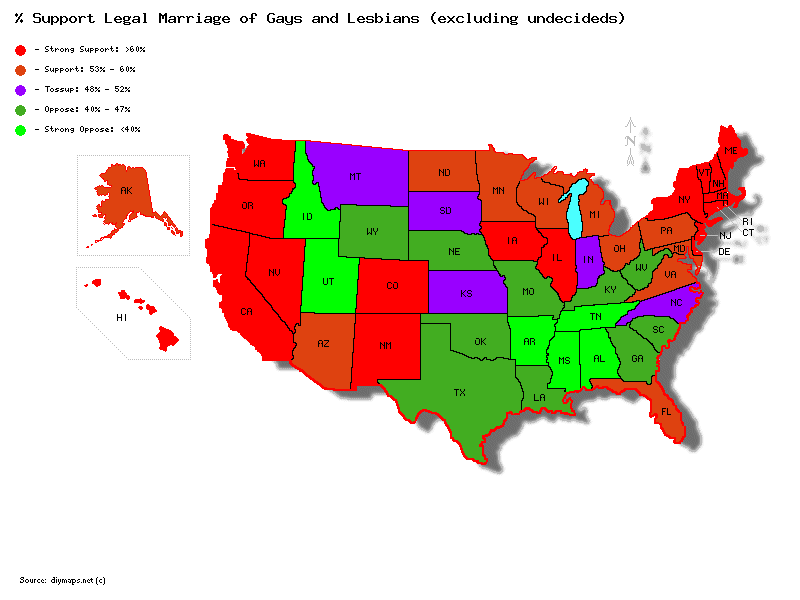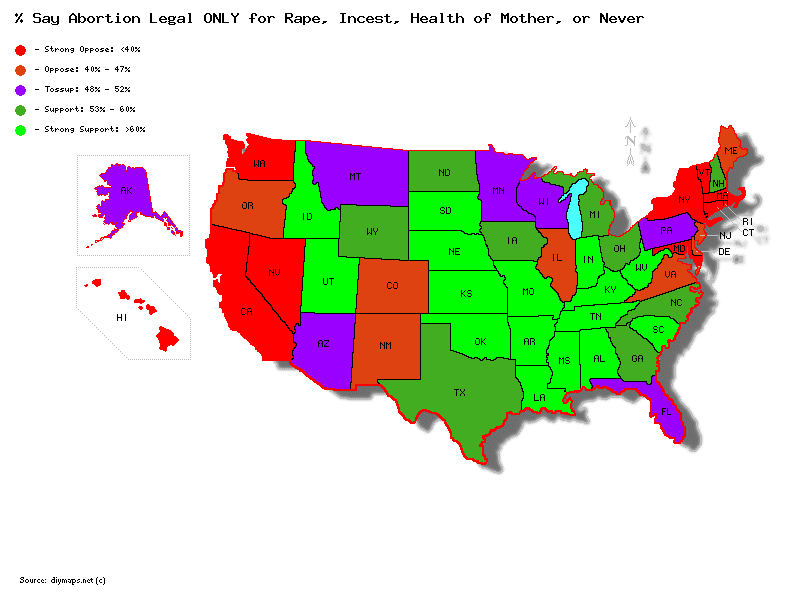One of my occasional themes here at De Civ has been the fact that one of the most common, most influential tropes in American politics is completely wrong. Most commentators think that abortion and marriage are politically linked: if abortion restriction gets the upper hand, then say good-bye to same-sex marriage, and vice versa. Major Republican politicians regularly complain that, because Republicans have lost on the definition of marriage, therefore Republicans should surrender on all social issues, or they will lose all elections forever.
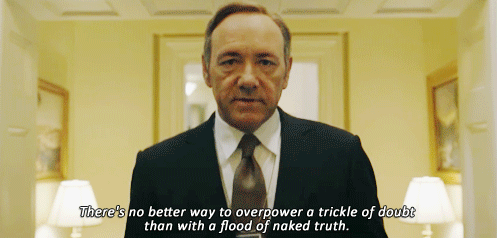
At the extreme ends of the spectrum, there’s a certain truth to the trope: the Christian Churches that generally make up the backbone of the anti-abortion movement also make up the backbone of the anti-marriage-redefinition movement. And the Supreme Court justices who claim that abortion — at any time, for any reason — is a constitutional right are exactly the same justices who claim the same for same-sex civil marriage. And so on, throughout the extreme bases of both movements. Pundits spend most of their time talking to extremists, because extremists are the people who get engaged, get involved, and get important. It would not be unreasonable to argue that every single person who lives on the inside of Interstate 495 is, compared to the average American voter, a radical extremist. And so extremists set all political narratives, including this one.
But elections aren’t decided by extremists. They’re decided by the average voter. And the average voter is a strange duck. A new set of thorough, state-level polling data jointly released last month by YouGov, CBS News, and the New York Times makes this clear in a way that most pundits haven’t come to appreciate yet. (Here is the corresponding national data.)
First: it’s not too soon to proclaim that same-sex civil marriage has won over America. The average voter supports it. And that’s not just because huge, highly polarized populations concentrated in Seattle and NYC support it, as some marriage conservatives have argued. Support for same-sex civil marriage is geographically widespread. Indeed, if a presidential election were held today, and the only issue anyone cared about were same-sex marriage, the marriage liberal (Democrat) would defeat the marriage conservative (Republican)… and it would be a landslide. Excluding voters who polled as “don’t know / not sure” (who reliably break for marriage redefinition anyway), here’s what that electoral map would look like:
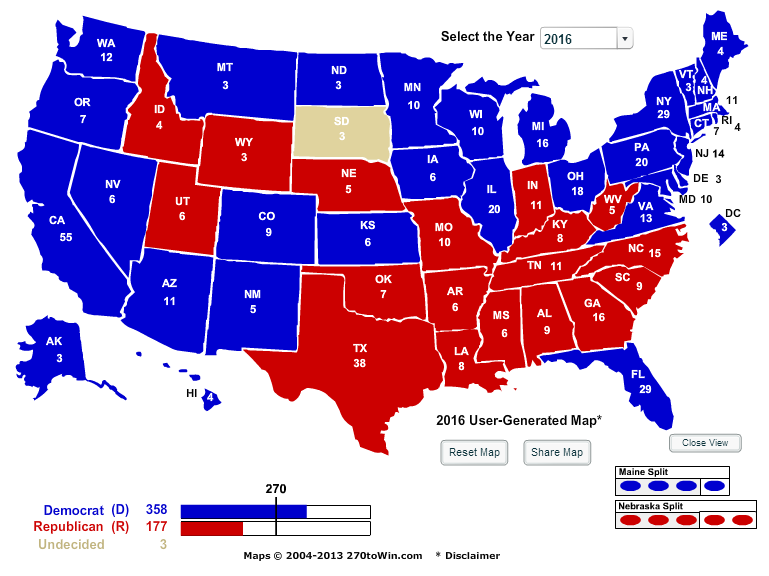
Given the rapid pace at which this issue is marching away from conservatives, this map is only going to get more favorable to same-sex civil marriage, not less. While, ten years ago, marriage naturalists could reliably count on a majority in nearly every state in the Union — gay civil marriage was overwhelmingly opposed, even ridiculed — that consensus has completely evaporated in world-record time. Indeed, even if the pace of opinion change slows dramatically, in a few years, there will still be enough national support for gay marriage to propose and ratify a constitutional amendment guaranteeing it. This issue is, from a strictly political standpoint, dead as a doornail. (And, from a strictly personal standpoint, meh. Good riddance, even. Look for my upcoming blog post, which has been in the works for over a year now: “Civil Marriage Is Dead, And It Deserved To Die.”)
So, the average American voter supports same-sex civil marriage. This support is strong, it is geographically and demographically broad, and it is getting bigger every day. Nothing is likely to reverse it until and unless serious problems with single-sex parenting are proved — which, given the scarcity of longitudinal data, plus the witch-hunt atmosphere currently prevailing in academic sociology on this point, isn’t likely to happen for decades.
The average American voter also supports extreme abortion restrictions.
“James, how can a restriction be ‘extreme’ if most Americans support it?” I use the word “extreme” advisedly here. The media regularly informs me that practically any regulation of abortion in these United States is “extreme.” These “extreme” restrictions are overwhelmingly popular, but that’s the lexicon the media has given us. Go figure.
The thing is, the average American voter doesn’t just overwhelmingly support “moderately extreme” abortion proposals, like requiring abortionists to have admitting privileges at a nearby hospital. According to YouGov, the average American would make all abortions illegal, except in limited special circumstances (such as the baby being the result of rape or incest, or the pregnancy threatening the health of the mother).
This was not a poll where ambivalent or moderate voters lacked other options, either: the only more restrictive option was “abortion should always be illegal,” while the less restrictive options were, “abortion should always be legal,” “abortion should be legal until the fetus can live outside the womb” (the “viability” standard supposedly endorsed by Roe v. Wade), and “abortion should be legal until the end of the first trimester” (a typical “moderate” fallback position for pro-choicers who are uncomfortable defending late-term abortion).
Given these options — including the “first trimester” option, which is already so restrictive the Supreme Court considers it unconstitutional — the average voter nevertheless chose to support banning all abortions except in very limited circumstances.
In other words, the average American supports abortion restrictions so strong they would outlaw approximately 88% of U.S. abortions. The average American supports abortion restrictions so far beyond the pale of what the Supreme Court allows that no legislation has even flirted with coming close to what Americans actually want on abortion in the two decades since Planned Parenthood v. Casey (besides the very occasional, very unsuccessful forays of the Personhood movement). The Supreme Court would have a conniption. Planned Parenthood would financially implode.
And yet, if we had a presidential election tomorrow, where the Democrat wanted to keep abortion completely legal only until the end of the first trimester, while the Republican wanted to ban all abortions, except when the baby is the product of rape or when the pregnancy threatens the health of the mother, if no other issues mattered, then the Republican would win. Here’s the electoral map:
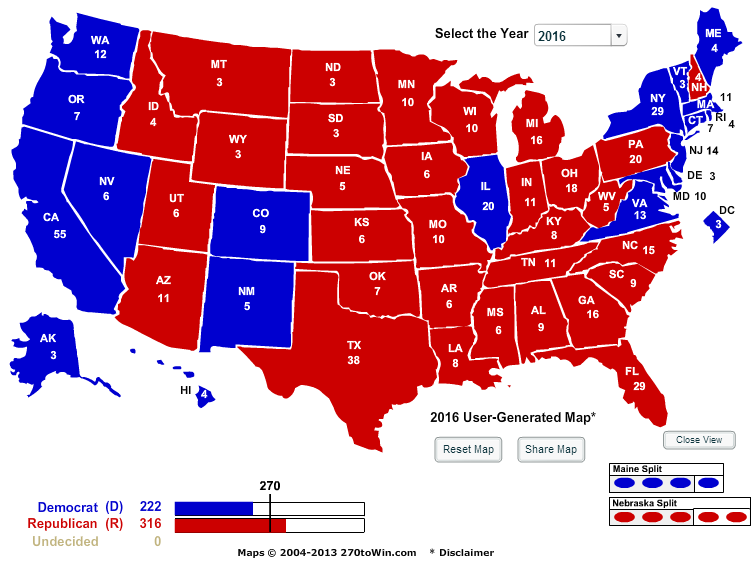
You may recognize this map as something Republican presidential candidates have not witnessed in over 22 years — something which seems increasingly out of reach in the modern political climate. You may recognize this as a Republican electoral landslide.
If the terms of the election were slightly different — if the Republican candidate simply supported banning all abortions after the first trimester, while the Democrat supported keeping abortion legal up until viability — then the Republican would win every single state in the union… except Vermont, which would be deadlocked 50-50:
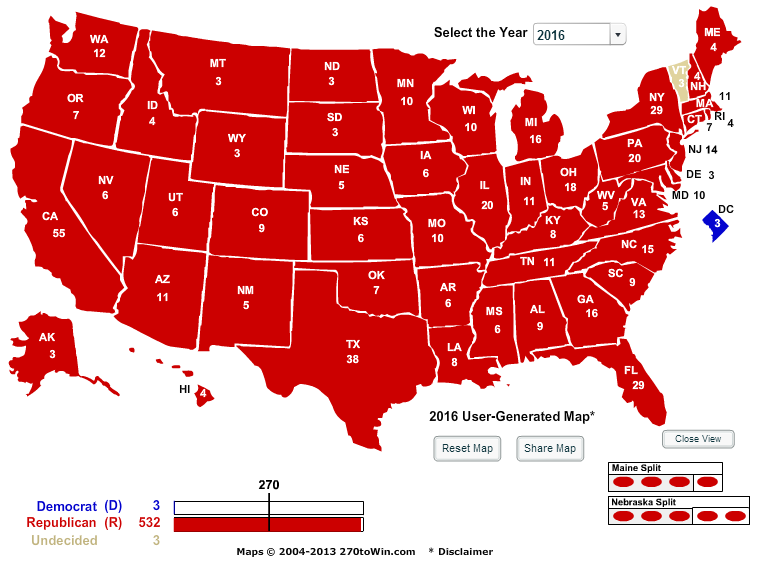
Note that Democrats do not, in fact, support banning abortion after viability. Democrats believe abortion must always be legal, at any point in pregnancy, for any reason, and should ideally be directly subsidized by the government. (Here’s their most recent national party platform: “The Democratic Party strongly and unequivocally supports… a woman’s right to make decisions regarding her pregnancy, including a safe and legal abortion, regardless of ability to pay. We oppose any and all efforts to weaken or undermine that right.”) Official Democratic doctrine on abortion is so extreme, even Vermont wouldn’t support it. (D.C. might. See my comment at the top about how everyone inside the Beltway is an extremist.)
So, if you are running for presidential office, and you are Frank Underwood and don’t care about how you win as long as you do win, then you should support gay marriage and support tight restrictions on abortion — restrictions so tight that today’s Supreme Court will strike them down twenty minutes after you pass them into law.
The extreme camps on either side — the so-called “feminists” and the institutional Christians — will call you an irrational, inconsistent hypocrite.
But the average American voter will give you his vote, and, if you’re Frank Underwood, that’s all you care about.
Postscript. Here are some more detailed maps showing the strength of geographic support for same-sex marriage / “extreme” abortion restrictions. I decided to dispense with the traditional red/blue color scheme, because the electoral fault lines are not quite the same as the traditional Republican/Democrat fault lines — the West and Midwest in particular contain some surprising results for conventional wisdom. For the purposes of the electoral college maps above, of course, I resolved tossups in favor of the majority, however narrow that majority may have been:
UPDATE 14 December 2021: Link rot changed the URLs to the polling data on which this post is based, so I updated the links. Thanks, Wayback Machine!

